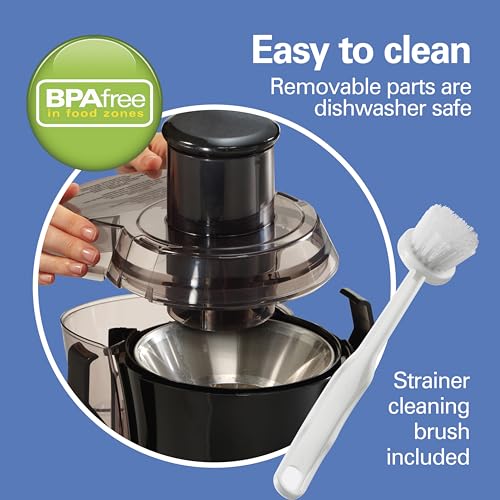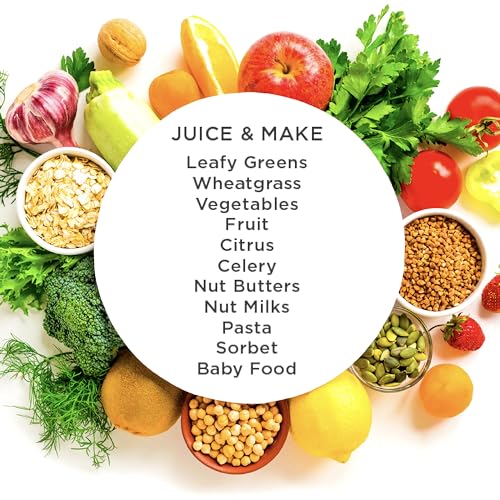Sort by:
Editors' Choice
Avg. User Rating
Number of Ratings
Popularity
Price: Low to High
Price: High to Low
9.9
1
BREVILLE
9.9
Breville Juice Fountain Plus JE98XL, Silver
Type: Centrifugal
Feed Chute: 3" wide
Settings: 2 speeds
Container Capacity: 35.2 oz jug
Picked by 723 people this week!
Picked by 723 people this week!
9.9
1
Breville Juice Fountain Plus JE98XL, Silver
BREVILLE
Type: Centrifugal
Feed Chute: 3" wide
Settings: 2 speeds
Container Capacity: 35.2 oz jug
9.7
2
LQZ
9.7
Cold Press Juicer, Masticating Juicer with 5.4" Wide Feed Chute, 350w Slow Juicer Machines Fit Whole Vegetables and Fruits,Juic...
Type: Masticating
Feed Chute: 5.4" wide
Settings: 1 speed + reverse
Container Capacity: Not indicated
9.7
2
Cold Press Juicer, Masticating Juicer with 5.4" Wide Feed Chute, 350w Slow Juicer Machines Fit Whole Vegetables and Fruits,Juic...
LQZ
Type: Masticating
Feed Chute: 5.4" wide
Settings: 1 speed + reverse
Container Capacity: Not indicated
9.3
3
TUUMIIST
9.3
Juicer Machines, TUUMIIST Cold Press Juicer with 4.25'' Large Feed Chute Fit Whole Vegetable And Fruit, Masticating Juicer Easy...
Type: Masticating
Feed Chute: 4.25" wide
Settings: 1 speed + reverse
Container Capacity: 27 oz cup
9.3
3
Juicer Machines, TUUMIIST Cold Press Juicer with 4.25'' Large Feed Chute Fit Whole Vegetable And Fruit, Masticating Juicer Easy...
TUUMIIST
Type: Masticating
Feed Chute: 4.25" wide
Settings: 1 speed + reverse
Container Capacity: 27 oz cup
9.1
4
HAMILTON BEACH
9.1
Hamilton Beach Juicer Machine, Big Mouth Large 3” Feed Chute for Whole Fruits and Vegetables, Easy to Clean, Centrifugal Extrac...
Type: Centrifugal
Feed Chute: 3" wide
Settings: Single speed
Container Capacity: 20 oz container
9.1
4
Hamilton Beach Juicer Machine, Big Mouth Large 3” Feed Chute for Whole Fruits and Vegetables, Easy to Clean, Centrifugal Extrac...
HAMILTON BEACH
Type: Centrifugal
Feed Chute: 3" wide
Settings: Single speed
Container Capacity: 20 oz container
8.9
5
KOIOS
8.9
1300W KOIOS Centrifugal Juicer Machines, Juice Extractor with Extra Large 3inch Feed Chute, Full Copper Motor, Titanium-Plated ...
Type: Centrifugal
Feed Chute: 3" wide
Settings: 3 speeds
Container Capacity: 16 oz jug
8.9
5
1300W KOIOS Centrifugal Juicer Machines, Juice Extractor with Extra Large 3inch Feed Chute, Full Copper Motor, Titanium-Plated ...
KOIOS
Type: Centrifugal
Feed Chute: 3" wide
Settings: 3 speeds
Container Capacity: 16 oz jug
8.8
6
BREVILLE
8.8
Breville the Juice Fountain Compact Juicer, 10" x 10.5" x 16", Silver
Type: Centrifugal
Feed Chute: 3" wide
Settings: 1 speed
Container Capacity: 25 oz jug
8.8
6
Breville the Juice Fountain Compact Juicer, 10" x 10.5" x 16", Silver
BREVILLE
Type: Centrifugal
Feed Chute: 3" wide
Settings: 1 speed
Container Capacity: 25 oz jug
8.7
7
AMUMU
8.7
Cold Press Juicer, Amumu Slow Masticating Machines with 5.4" Extra Large Feed Chute Fit Whole Fruits & Vegetables Easy Clean Se...
Type: Masticating
Feed Chute: 5.1" wide
Settings: 1 speed
Container Capacity: Not specified
8.7
7
Cold Press Juicer, Amumu Slow Masticating Machines with 5.4" Extra Large Feed Chute Fit Whole Fruits & Vegetables Easy Clean Se...
AMUMU
Type: Masticating
Feed Chute: 5.1" wide
Settings: 1 speed
Container Capacity: Not specified
8.6
8
HAMILTON BEACH
8.6
Hamilton Beach Juicer Machine, Big Mouth Large 3” Feed Chute for Whole Fruits and Vegetables, Easy to Clean, Centrifugal Extrac...
Type: Centrifugal
Feed Chute: 3" wide
Settings: 1 speed
Container Capacity: N/A
8.6
8
Hamilton Beach Juicer Machine, Big Mouth Large 3” Feed Chute for Whole Fruits and Vegetables, Easy to Clean, Centrifugal Extrac...
HAMILTON BEACH
Type: Centrifugal
Feed Chute: 3" wide
Settings: 1 speed
Container Capacity: N/A
8.5
9
OMEGA
8.5
Omega NC900HDC Cold Press Juicer Machine, Vegetable and Fruit Juice Extractor and Nutrition System, Dual-Stage Slow Masticating...
Type: Masticating
Feed Chute: 2" wide
Settings: Manual speed
Container Capacity: N/A
8.5
9
Omega NC900HDC Cold Press Juicer Machine, Vegetable and Fruit Juice Extractor and Nutrition System, Dual-Stage Slow Masticating...
OMEGA
Type: Masticating
Feed Chute: 2" wide
Settings: Manual speed
Container Capacity: N/A
8.3
10
VINCI
8.3
Vinci Hands Free Electric Citrus Juicer, 1-Button Juicer Machine, Orange Lime Grapefruit Lemon Squeezer, Easy to Clean Orange J...
Type: Automatic press
Feed Chute: None
Settings: 1 speed
Container Capacity: 12 oz bowl
8.3
10
Vinci Hands Free Electric Citrus Juicer, 1-Button Juicer Machine, Orange Lime Grapefruit Lemon Squeezer, Easy to Clean Orange J...
VINCI
Type: Automatic press
Feed Chute: None
Settings: 1 speed
Container Capacity: 12 oz bowl
Our Top Choice
9.9
1
BREVILLE
9.9
Breville Juice Fountain Plus JE98XL, Silver
Type: Centrifugal
Feed Chute: 3" wide
Settings: 2 speeds
Container Capacity: 35.2 oz jug
Picked by 723 people this week!
Picked by 723 people this week!
9.9
1
Breville Juice Fountain Plus JE98XL, Silver
BREVILLE
Type: Centrifugal
Feed Chute: 3" wide
Settings: 2 speeds
Container Capacity: 35.2 oz jug
Compare Features
Container Capacity
1. Breville Juice Fountain Plus Juicer
2. LQZ Cold Press Juicer
3. TUUMIIST Juicer Machine
4. Hamilton Beach Pro Juicer
5. KOIOS JE-70 Centrifugal Juicer
6. Breville Juice Fountain Compact Juicer
7. Amumu Cold Press Juicer
8. Hamilton Beach 67601A Juicer
9. Omega NC900HDC Juicer Extractor
10. Vinci Electric Citrus Juicer
Deal
Save 39%
Save 35% + $30 Coupon
Save 20% + $10 Coupon
—
Save 46% + $10 Coupon
—
Save 29%
—
—
—
Deal
Save 39%
Save 35% + $30 Coupon
Save 20% + $10 Coupon
—
Save 46% + $10 Coupon
—
Save 29%
—
—
—
Type
Type
Feed Chute
Feed Chute
Settings
Settings
Container Capacity
Container Capacity




















































































